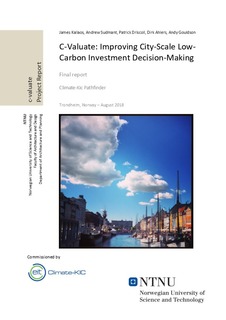C-Valuate: Improving City-Scale Low-Carbon Investment Decision-Making: Final report
Research report
Published version

Åpne
Permanent lenke
http://hdl.handle.net/11250/2607887Utgivelsesdato
2018Metadata
Vis full innførselSamlinger
Sammendrag
Access to reliable, timely, and relevant information is fundamental in most areas of decision-making but may be especially important in complex fast-moving fields where multiple ideas, approaches, or options compete for limited resources. The low-carbon cities space is exactly such a field, with many cities seeking to accelerate and intensify their flow of low-carbon investment. However, there are diverse sources of information making different and sometimes competing claims about the potential contribution of various low-carbon options. The ability of city-level decision-makers to access real, empirical, data on different options, drawn from monitoring and evaluation of actual ex-post performance, is widely lacking. This is a significant concern as the absence of such data hampers decision-makers’1 ability to make sound and informed investment decisions, which restricts the rate of decarbonisation by increasing the risks and costs of low-carbon investment while reducing rates of innovation and learning. This feasibility study examines the nature of this challenge in the context of low-carbon investment decision-making in cities and whether it could be resolved through a new approach to the collection and communication of evidence on the real performance of a wide range of low-carbon options that could be adopted in cities and communities around Europe. It finds that: • City-scale low-carbon investment decisions are typically taken against a backdrop of multiple stakeholders, competing priorities, tight budgets, pressing deadlines, contextually-specific conditions and a wide range of competing options. It therefore highlights the prevalence of context-specific decision-making under conditions of complexity and uncertainty. • When making investment decisions, city-level decision-makers rely most heavily on their own experience, on internal sources of information and on personal contacts to guide decision-making. If economic data on the performance of a low-carbon options is available, it is not available for all alternatives, and data on the chosen option is often considered only late in the decision-making process. Drawing on a review of existing platforms and organisations, a survey, and interviews with city-level decision-makers, this study proposes an approach that could be applied by cvaluate to stimulate evaluations of the real performance of low-carbon options and the provision of trustworthy, relevant information on performance to investors and decisionmakers. It is argued that this approach could reduce the costs and the risks of low-carbon investments in cities and communities across Europe whilst also accelerating innovation and learning and the transition to a low-carbon economy.